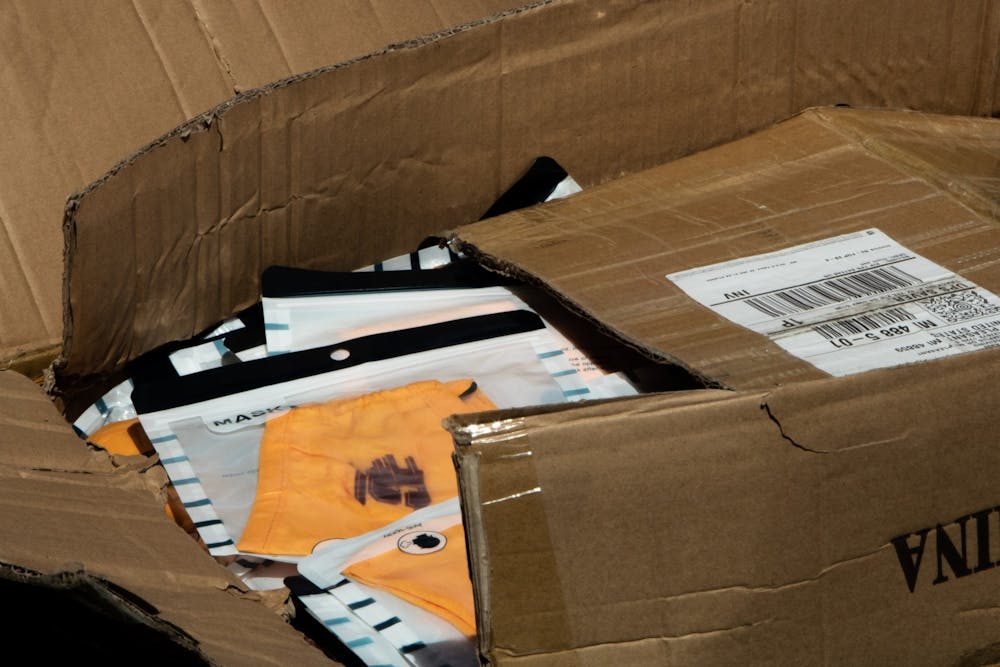Students react to new COVID-19 procedures

Gold masks with the flying C are waiting to be handed out to students for free Aug. 17 outside of the Bovee University Center.
After a spike in COVID-19 cases, Central Michigan University is beginning to take additional steps to slow the spread of the virus.
In the first week of the fall semester, Isabella County had 54 new cases of COVID-19 attributed to students. In response, the county signed an executive order limiting gatherings to 25 people from 100. Now, about 100 cases have been linked to CMU.
An email to CMU on Aug. 28, from President Bob Davies laid out plans for on-campus testing and canceling CMU housing contracts, stating the university will continue to stay open as long as it can manage.
“I have been asked several times what would trigger CMU to shift to remote-only instruction,” Davies said. “Our goal is to continue in-person instruction for as long as we feel we are able to manage and mitigate risk related to COVID-19. If we feel we are no longer able to do so, we will shift.”
In addition to changes by the county, Davies said in an email on Aug. 24 that CMU made changes to its on-campus response to the virus and to "proactively prevent further spread" including:
- Directing all Greek organizations to suspend all in-person activities.
- Working with landlords and apartment complex managers to enforce limits on gatherings.
- Fining, and even suspending, individuals who host and attend large gatherings moving forward through our Office of Student Conduct.
- Partnering with a private company, Helix, to begin on-campus testing within the next week for individuals who have been identified as symptomatic or close contacts. Student-athletes also will be tested as required by the (NCAA).
Student Body President Katie Prebelich said she is happy with the way the university has responded to the spike in cases. However, she said some of the protocols could have been made before students returned to campus.
"We are in uncharted territory going to a university in the middle of a pandemic. It's something we haven't had to deal with before," Prebelich said. "I applaud CMU for recognizing that changes are going to be made while keeping the students' safety in mind. Looking back, I think decisions could have been made before students returned to campus, but I'm glad they're being made now."
Prebelich said she would have liked to see on-campus testing established before students returned to campus. Nonetheless, on-campus testing was a welcome sight to Prebelich.
"We need to make sure that all students have access to testing and access to the resources needed to help stop the spread," Prebelich said. "When we're thinking about on-campus students and students who may not have cars, that was a really great addition that they made."
Jalen Ferrebee, a junior from New York, said the mandates and protocols he had to follow at home over the summer were similar to those implemented at CMU. He was not surprised by the changes.
Ferrebee said he has questions about how the university is going to enforce its new guidelines for students.
"I feel like (Davies) does some really drastic stuff," Ferrebee said. "I wasn't surprised (by the changes), but I was thinking, 'how are they going to know and enforce that?' and 'how are they going to know if you have 50 people in your house?'"
Kendall Hoyt, a sophomore from Palos Verdes, California, said changes she has seen on campus -- wearing a face shield in her labs and masks on campus -- are uncomfortable, but she is OK with the changes. After all, she just wants to be on campus.
"We're lucky to be here," Hoyt said. "It's OK that it's happening right now because a lot of other schools aren't going back, so I think that it's OK to have fines (and misdemeanors) because I want to be here as long as I can."
Prebelich said all of the changes and protocols are in place to keep the student body safe. She wants to see the university follow through and make sure the students adhere to the rules.
Ultimately, Prebelich said student safety is up to the students.
"A lot of us expect administrators to put policies in place, reinforce those and follow through on those," Prebelich said. "That's absolutely acceptable and needed, but it also starts with us.
"We need to make sure we're following protocols to keep ourselves and our friends safe."




